- 9890288011/9403407269
- connect@forrest-india.org
- Pune, India
FORREST is working on “FARMERS FOR BIRD CONSERVATION” a community led initiative of conserving birds in non-protected village areas of India.
Through the work village farmers are implementing conservation-friendly practices which will benefit both farmers and the birds.
Non protected areas like farms, grasslands, wetlands and village forests support high bird diversity. Even when conservation planning in such unprotected areas is crucial, it is rarely carried out actively. This project intends to initiate this crucial work of bird conservation at the grassroot level.
The project includes-
Sudhagad Wildlife Sanctuary is a newly declared wildlife Sanctuary spread over Pali and Pune districts of Maharashtra. This forest trek is one of the ancient Sahyadri passes that joins ghat to Konkan area and Andharvan offers endless trudge through the thicket forest.
The footfall of Pune part of Sudhagad Wildlife Sanctuary, Andharvan forest is 2-3 Lakh visitors per year. Nearby villagers do take visitors as guides to this trek, but it was a random activity. After declaration of the Sanctuary, the Forest Department decided to regulate this tourism and train the local villagers as nature guides.
The training was conducted by FORREST along with Maharashtra Forest department on 11 th April 2023. at Pimpri village, Mulshi Taluka. The primary objective of the training was to train villagers in-
Trained guides will provide improved visitor experiences and professional nature guiding services locally. In Sudhagad Wildlife Sanctuary, with rich flora of fauna of western ghats, the opportunities for wildlife viewing and promoting the concept of community-based biodiversity conservation are immense.
The training is with the vision to connect forest and biodiversity conservation with livelihood generation and if the villagers can gain economic benefit from nature guiding, they are more likely to embrace biodiversity conservation.
To provide safe, purified, and cool drinking water throughout the year at Karnala Bird Sanctuary, Panvel Taluka, Maharashtra, two RO Purifiers were installed by Forest Regeneration and Environmental Sustainability Trust (FORREST) in collaboration with the Maharashtra Forest Department with support of AWS InCommunities.
The visitor’s footfall is 1.5 to 2 lakh visitors per year leads to usage of 2 to 3 Lakh plastic water per year. Plastic waste generated at the Sanctuary has dire consequences for forest ecosystem and its biodiversity. To minimize the plastic waste generation, the installation of RO water purifiers is an impactful initiative and is already decreased the plastic bottle usage in the Sanctuary.
Installation of camera traps to understand wildlife presence and movements is carried out by Forest departments in protected areas regularly.
For camera traps installation at Sudhagad Wildlife Sanctuary, Raigad which is newly declared sanctuary in Maharashtra, technical training of camera traps was conducted on 5th February 2023 by Forest Regeneration and Environmental Sustainability Trust (FORREST) for the Sudhagad forest department field team.
For the practical part of training, camera traps were installed by the Forest department team along with FORREST team at strategic locations at Sudhagad Wildlife Sanctuary.
Data from Camera trap will be used for Wildlife Conservation planning at Sudhagad Wildlife Sanctuary by the forest department.
Setting up bee boxes at Aditi leaning Centre, Kusgaon, Kamshet. A circle has been complete at ALC -with Restoration of forests, Rainwater harvesting, Soil conservation initiatives, Documentation of Biodiversity, Documentation of changes happening in the ecosystem over the years and now introducing bees for pollination. The vision with setting up bee boxes is not to harvest honey but to increase pollination in the area.
Once seen frequently in the wild, fewer and fewer wild colonies exist today due to increasing use of chemicals in every everyday life, in farms and in gardens. At Aditi Learning Centre, bees will thrive as there has been no chemicals used in the area since last decade.
The most important thing that bees do is pollinate. And survival of Humans depends on that. Decreasing chemicals in any way we can, would help bees survive and in turn help humans survive.
Let it bee
For Ecological connectivity and unimpeded movement of wildlife, wildlife underpass was created at Karnala Bird sanctuary few years back. This wildlife underpass needed design corrections for better wildlife movement.
FORREST worked on the improvement in wildlife corridor design of wildlife underpass at Karnala Bird Sanctuary, Navi Mumbai in March-May 2022. The work was carried out in collaboration with Forest Department of Maharashtra, National Highway Authority of India and supported by AWS InCommunities.
Forest Regeneration and Environmental Sustainability Trust (#FORREST) recently completed the enrichment planting of keystone tree species all over the Karnala forest. Karnala Sanctuary Forest Department team, led by PCCF (Wildlife) Maharashtra Mr. Sunil Limaye along with local school children participated in the ficus plantation drive in the forest.
The enrichment planting has been done with the vision of:
The work was carried out in collaboration with Forest Department of Maharashtra and supported by AWS InCommunities.

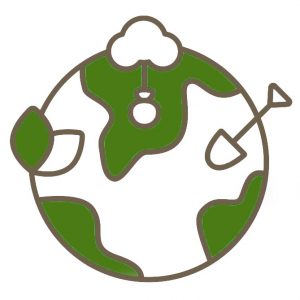
FORREST worked on creation and ecological restoration of MICROSOFT’s “Velimala Forest Park” at Velimala, Sangareddy, Telangana. Velimala Forest Park has been established at a reserve forest of 12 Acres at Velimala village near Hyderabad. The ecological restoration work involved-
Project Highlights
This Reserve Forest restoration and conservation work is a collaborative project of Microsoft India, Telangana Forest Dept., FORREST and Gamlaa Bioscapes Pvt. Ltd.
India bears the second-most cost of loss due to invasive plants species globally. Invasive alien species or non-native exotic species degrades soil, replaces native vegetation, destroys local biodiversity and add huge burden to the economy by degrading the entire ecosystems. Invasive species causes irreparable damage to natural resources by destroying the ecological balance between plants, animals, soil, and water achieved over many thousands of years.
At Sanjay Gandhi national Park the invasive species of Chromolaena odorata is degrading the forest ecosystem slowly over the years. More than 50 Acres of forest is invaded by Chromolaena odorata aptly knows as “ran-mari” or forest-killer. Through this habitat restoration work at Sanjay Gandhi National Park, Borivali, Mumbai, Chromolaena odorata has been removed from 15 Acres of the core forest area manually as machines can not disturb the core forest area.
After clearing the area of invasive species, 6500 forest trees, shrubs and grasses were restored back in the forest. Flora of Sanjay Gandhi Forest was researched, and 139 native trees and grasses species were selected for this restoration. This restoration is a 3-year project and funded by AWS InCommunities.
For planning an eco-village community, land situated at Otavane village, Sawantwadi, Maharashtra, a rapid biodiversity assessment was conducted to determine its flora and fauna. Such pre study is crucial for land development planning considering the biodiversity, the forest trees, natural streams, and overall land ecology, which should never be disturbed for sustainable planning, intact ecological balance, and water integrity.
Seasonal Biodiversity Assessment of newly declared Sudhagadh Wildlife Sanctuary, Maharshtra is carried out by FORREST.
Sudhagad Wildlife Sanctuary is spread over the districts of Pune and Raigadh and is nestled in the biodiversity-rich Western Ghats with vast scope for conservation research and works.The total area of the Wildlife Sanctuary is 77 sq km. Seasonal survey visits are being done to determine occurrences & diversity of birds, butterflies, other insects, mammals, reptiles, crustaceans and flora of the sanctuary.
This biodiversity documentation of the area is part of Conservation and Management plan of the Sudhagad wildlife Sanctuary.
Shashwat is a private conservation area at Maval taluka, Pune. About 50 acres of the area is being used for Organic farming and organic dairy. Rest of the area has been reserved in its natural state as conservation area.FORREST is conducting an Ecological assessment & working on long-term conservation planning of this private conservation area.
Bhamburda is one of the highest hill range in the Pune city. Bhamburda forest garden has been developed by Forest department to conserve the hill.To assess biodiversity of the Bhamburda Forest Garden seasonal assessment surveys were performed.Biodiversity of plants, mammals, birds, butterflies, other insects, reptiles, amphibians were prepared.


Bhamburda is a community garden situated in the Pune city, which was selected to prepare model development plan for conservation of urban green pockets.
Conservation of these green pockets helps in sustaining urban biodiversity, reduce heat island effect, mitigate pollution etc.
Project area was divided into zones as per the ecological features and observations. etailed zone-wise ecological data was collected. Seasonal surveys were performed to gather data for ecology and biodiversity richness. Role of community participation in the conservation was documented.
During a village visit to Ambi, we heard of an orphanage and decided to visit it. It was 2021 and our first introduction to Kalashram. The administrators gave us a tour of the orphanage and its 6 Acre land. The land was barren with few thorny trees growing there. They told us that there is no groundwater and borewell run dry. We discussed the possibility of restoring the forest in the campus to restore soil, ground water and biodiversity.
We found the opportunity when Ocean network Express (ONE) expressed their wish to collaborate for another forest restoration. Thus, in 2022 we re-visited to Kalashram to plan for this forest restoration. The preparation went on for 20 days and on 7th January team FORREST, Volunteers from ONE and children from Kalashram worked on this forest restoration.
With the vision to restore ground water, bring cooler microclimate, fruits -flowers for years to come and return of birds and bees we have restored another forest at Kalashram, Golewadi, Ambi. This forest has 450 trees of 80 native, ecologically suitable, local species. A trench surrounds the restored forest to prevent forest fire, to secure forest from cattle and to harvest rainwater.
Hope to expand the forest restoration work at Ambi village in years to come, as village has large barren lands and degraded landscape everywhere.
FORREST has worked on the forest restoration at Shirval, Satara district, Maharashtra. Total area of this campus is 28 Acres. The land in and around the project area is barren and degraded. Mr. S V Joshi the founder of Nichrome India limited, and owner of this land has vision to restore the forest in this barren area. The vision is to restore biodiversity, soil and water restoration of immediate and a larger area.
FORREST worked on forest restoration with 5000 trees in one acre. After research total 144 species of native, forest trees, ecologically suitable to the Shirval have been included in the restoration. The forest restoration is through Miyawaki Forest Restoration Technique.
DPS Patna approached FORREST to restore a forest in their school campus. They already have rainwater harvesting, waste recycling, botanical garden in their large campus. Restoring forest is in line with DPS Patna’s contribution towards decreasing their carbon footprint and inducting environmental conservation values in students.
FORREST restored a forest at DPS Patna school campus in June-July 2022. Students and teachers joined enthusiastically during the forestry drive.
Creating forest in school campus is very impactful, on the students and long-lasting impact on the school environment. Forest will provide a space to learn about forest trees, forest ecosystem, about biodiversity and how forest supports it.
This forest has 65 ecologically suitable forest trees species in it.
Under its Forrest Landscape Restoration (FLR) initiative FORREST has launched “Village Restoration Program” at Pirangut village, Mulshi Taluka, Pune, Maharashtra on June 1st, 2022.
This initiative targets regaining ecological functionality, towards enhancing villagers’ well-being. This pilot FLR is supported by Ocean Network Express, Mumbai through their CSR initiative.
FORREST team approached six villages near Pune, who initially accepted to work on forestry but refused to participate in the work. We refused to give in and keep approaching villages as we believed it is crucial to work on forest restoration at the grass roots
Pirangut’s Gramsevak Shri Bhojne and Sarpanch Shri Pawle are the first village representatives which accepted the proposal to work on “Sustainable village Development” with long term goal of water and biodiversity conservation at the village level.
We must realize that we as a world have already crossed the line where mere planting of trees can be considered enough. FLR opts to make these communities realize the need to restore entire landscapes towards a sustainable world.
During the forestry drive the villagers, team of Ocean Network Express joined hands with FORREST team.
Allianz’s Pune supported a pilot forest restoration at EON IT Park, Kharadi. After a long process of almost 2 years the forest came into being in April 2022.
This land is a very rocky, barren, degraded with negligible topsoil. For restoration, 480 trees belonging to 107 forest species of native, ecologically suitable trees were selected.
Forestry was planned with the vision of restoring habitat, supporting biodiversity, and creating a platform for conservation consciousness.
Restoration was carried out with Miyawaki forestry technique.
Bosch and Brembo India collaborated to conserve a waterbody and convert it into a Biodiversity Park at Nanekarwadi, Chakan MIDC, Pimpri Chinchwad. FORREST partnered with Bosch and Brembo to restore forest through Miyawaki forestry technique and create this biodiversity park. Employees of Bosch and Brembo participated in forestry drives.
Restored forest has 1220 trees, for which 112 ecologically suitable, native forest trees, shrubs and grasses were selected. Along with the forestry, water bund was created, boulder sitting area was created, pathway was made, and FORREST is also documenting the biodiversity of the area.
This 5 Acre Biodiversity area with 2 Acres of water body in it would be a platform to educate, inspire, conserve and provide ecological functions in an industrialized set up.
FORREST is creating a Greenbelt at Sesa Goa, Navelim for Vedanta Limited.
For creating greenbelt at Sesa Goa, Miyawaki forestry technique is being adopted. This upcoming Miyawaki forest has 7500 trees specifically selected from this eco region.
Though a green belt is a buffer zone beyond the operating industry, created to act as sink for the gases released and to absorb sound created by the operating machines, we have envisioned this Miyawaki forest beyond this. This forest would be a Biodiversity restoration zone and seed bank for forest trees of western ghat.
This is an ongoing project.
FORREST worked on habitat restoration through forestry along the Khadakwasla lake bank in May 2021. This forest was restored on the de-silted sediments extracted from the lake and deposited on the lake bank.
Khadakwasla Lake is the main source of water for Pune and its suburbs. With increasing habitation around lake, agricultural activities along the bank, soil erosion on land and activities in the water, siltation in the lake is constant. De-siltation of this lake is being done by green thumb organization for the last 10 years with the help of CSR of numerous companies.
FORREST carried out this project in collaboration with Green Thumb, Pune and funding support of Cummins India Pvt ltd.
FORREST restored a forest of 2000 trees with 120 ecologically suitable, native, forest tree species in the riparian zone of Khadakwasla lake. Forest restoration in this riparian zone is crucial as restored forest will prevent soil erosion and decrease siltation in water in the first place. Forest will restore habitat biodiversity, will positively influence flora and fauna of a very larger and of aquatic ecosystem. In long term restored area will become a wildlife corridor along the lake bank.
Few people know that Delhi Public School (DPS) Pune, known for its education excellence is also a place where environment education comes live. Already having a vermi- composting unit, vegetable garden, campus full of trees, they decided to create a forest at their Mohammed Wadi, school campus.
FORREST worked with enthusiastic DPS team to create this forest. Teachers and staff participated in the forestry drive. Together we created a space for students to have learning opportunities, to know forest ecology and biodiversity where sessions and activities will be conducted throughout the year.
80 species of native, local forest trees are selected for creating this forest.
A forest as a classroom to understand and to learn.
We intended for long that in every urban garden some part should be designated as urban forest where forest should be created which can be –
We approached Pimpri Chinchwad Municipal Corporation (PCMC) with the same vision, and they approved an urban forest in their upcoming Smart City Garden in Pune’s prime area. Knowing this could be a wonderful platform for creating awareness, we grabbed the project opportunity.
We approached few corporates and before project could materialize, COVID pandemic happened. Corporate funders backed out, but we still had this urban forest approval which we do not wanted to slip away. Raising part funding from donors, rest from FORREST and with the help of few enthusiastic volunteers we created this biodiversity pocket at the centre of the Pune City in Jan 2021.
Restored forest is at the riverbank in Smart Garden Pimple Nilakh with 450 trees belonging to 70 species of local native forest trees. Miyawaki forestry technique was adopted for creating the forest.
Thanks to PCMC for giving us another opportunity of restoration through forestry. Now we wait for this forest to welcome birds, butterflies and bees.
A farm owner has 28 acres of land in pristine forest of northern Western Ghats at Terdi village, Ratnagiri district of Maharashtra. With COVID pandemic, owner committed his entire land for forest and biodiversity conservation. For first phase of land restoration, natural forest around was studied and 95 forest plant species of Western Ghats were selected. For restoration forestry technique based on Miyawaki forestry technique was employed.
The forest restoration aims to make the farm area self-sustainable in 4-5 years. The forest will start generating various forest products which would generate income downstream through trading activities and processing. These forest produces will be chemical free and can be used for all-natural products.
Currently forest products are harvested from forest areas, depleting the wild genetic pool of our forests. Harvesting forest produces from regenerated farm forests on one hand will arrest indiscriminate exploitation, deforestation, and degradation of natural forests and on another hand will help farmers to make their farms self-sustainable.
Aquatica Frozen Foods Global Pvt Ltd a company at coastal Andhra Pradesh, Prakasam district sought restoration of one of their lands which was completely devoid of vegetation. To restore this area through forestry, a Miyawaki forest of huge proportions was created in Dec 2020 with 10000 trees of 104 native species. Company employees and staff too participated in forestry drives along with locals.
As there is no forest in about 100 km radius around this location, this forest will bring unparalleled changes in the local ecosystem and biodiversity.
Aditi Learning Centre is an organization in Kamshet, Pune, Maharashtra, which works on grass root levels for providing education & empowering school dropout girls, from rural areas.
The 11-acre campus area is kept in its natural conditions with natural vegetation which supports very high biodiversity. More forestry was planned at the open available areas. Four patches were selected for forestry at ALC. Forestry was carried out through Miyawaki forestry technique.
Forestry is planned with the vision of increasing the biodiversity richness of this ecoregion. ALC property has been used as a demonstration to awaken and educate people and organizations
Total 1320 native trees belonging to 66 species were selected and planted densely to match natural forest systems. Bamboos of 7 different species were planted along the boundary.
Girivan is Bungalow aggregate situated in Hotale village, Mulshi taluka of Pune, Maharashtra. It is situated in the Sahyadri hills with moist deciduous forest.
Miyawaki Forest was planned in a private property situated in Girivan. Three patches in the area were selected for small Miyawaki forests other than plantation at the periphery for screening the property.
Six layers of plants with 236 native trees of 51 species were selected and planted densely replicating the natural forests of the area.
Under “Atal Mission for Rejuvenation and Urban Transformation” scheme (AMRUT) Pimpri Chinchwad Municipal Corporation developed four gardens at Shahu-nagar, Laxmi-nagar and Punawale respectively. AMRUT is a flagship scheme of Central Government, which aims to provide cities with amenities like water supply, sanitation, open spaces and a pollution-free environment.
FORREST has worked with PCMC as Miyawaki consultant under AMRUT scheme, to create urban forests with Miyawaki technique. For creating urban forest, 12500 native trees belonging to 100 species were selected and planted densely to match our natural forest systems. Forestry was carried out at four different locations. Created forest patches are already attracting butterflies, bees and birds.
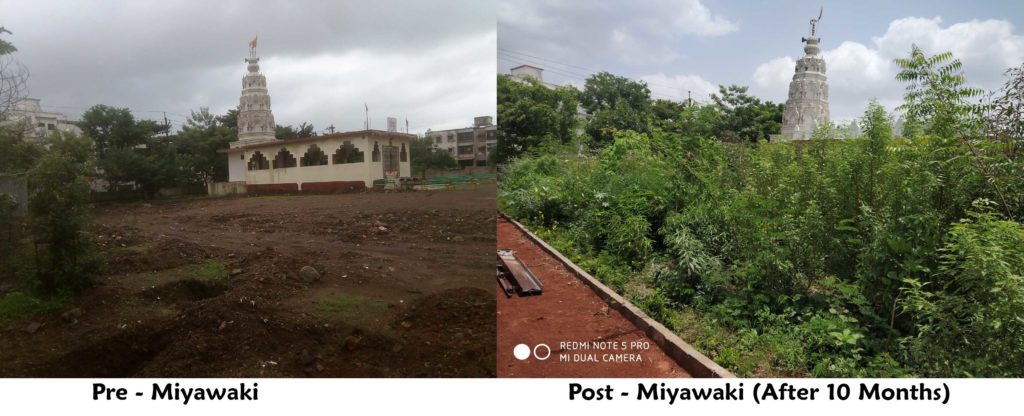 CDC1 – PCMC
CDC1 – PCMC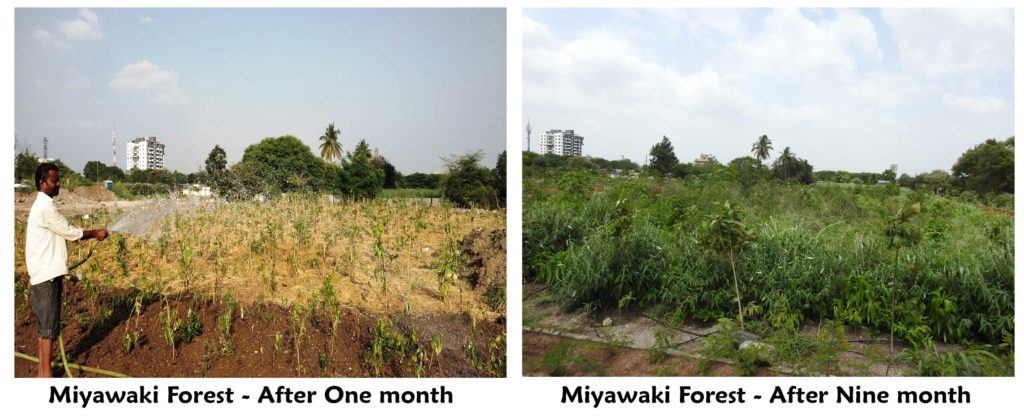 Punawale- PCMC
Punawale- PCMC
Forest plantations have been done in Aditi Learning Centre with Miyawaki technique. 1300 forest trees of more than 50 species of Indigenous trees have been planted in forest plantation area. FORREST is researching & documenting these forest Plantations to study the growth pattern of the forest plants & the changes it brings to the ecosystem and micro-climatic conditions.


Ecological Assessment and GIS mapping of the proposed gas pipeline route at three districts of UP and Haryana was conducted.
Proposed area was assessed and analysed through secondary data and GIS mapping for the presence of forest areas, important wildlife habitats, protected areas, mangroves, breeding and nesting sites of fauna, coastal areas, wetlands, grasslands, mangroves and other sensitive areas from proposed pipelines.
Aditi Learning Centre is a unique school in Kamshet with objective of providing education & empowering school dropout girls, from rural area. FORREST conducted an ecological assessment of ALC from January 2016 to March 2017.Seasonwise surveys were conducted to measure floral & faunal diversity & distribution of the area.
FORREST instigated seasonal ecological assessment of Mayureshwar Wildlife Sanctuary in collaboration with Forest Department in Jan 2016.This one of the kind field study focuses on assessment of current floral and faunal biodiversity of the sanctuary to develop a better conservation plan keeping in view the various environmental and social dynamics of the area.
Through the project minimization of waste at individual’s home was initiated. It involves home composting & minimization of polythene usage.Participants are empowerment through increased awareness regarding environmental problems & their solutions.91 % of the beneficiaries have learned composting well & are composting for 10 months. We plan to extend this project at community level. This will be community driven project with the vision of clean and green villages.
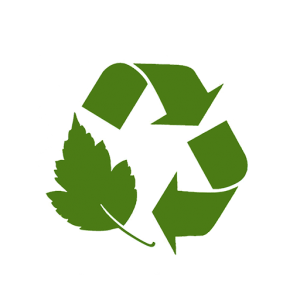

A model of how a landholder, with little effort can contribute to biodiversity conservation while managing the land in a sustainable way.
The stated land is in Borli, Raigad district. A seasonal stream flows through the land. Due to local disturbance, the water flow had started to erode the land. 3000-4000 square feet of land had been washed away in last 5 years!
Being adjacent to Phansad Wildlife Sanctuary, this was an opportunity to work on soil conservation with the vision to improve ecological value. The following interventions were done –
1. To prevent further soil erosion through sustainable soil and water conservation measures like Slope stabilization using coir geo-textile, stone bunds, J hooks.
2. Dense Miyawaki forest to bind soil firmly along the stream edge/ bank restoration. Native, original species of trees, shrubs and grasses were selected. Each trees were researched upon for how it will support biodiversity-local and migratory wildlife. Selected trees are mix of pioneer species, trees which can grow well in nutrient deficient soil, are drought resistant, increases soil carbon and fix nitrogen. Selected trees have medicinal value, have fruits, flowers and will support forest biodiversity.
3. Restoration of keystone species – 11 ficus species in a ficus grove
4. Removal of invasive species
Over the years the impact of this work will be monitored and documented.
A soil and water conservation work carried out at a barren, rocky land at 700 m on a hillside at Jawal, Maval taluka, Pune. As hilly areas have high rainfall, quick drainage pattern, staggered trenches were dug on steep hill slope to-
An earthen embankment was created to confine surface runoff and to increase ground water recharge. Seventeen species of native forest trees like Terminalia bellirica, Pterocarpus marsupium, Bombax ceiba were planted on the trench berms to prevent soil erosion and support the biodiversity of this scenic land.
Aditi Learning Centre at Kusgaon, Kamshet was facing water scarcity with the new developments being carried out. For water sustainability of the area, an earthen pond was constructed in June 2022, with water holding capacity of 14 lakh -15 lakh lit at a time
An earthen pond was constructed in the area where there was a natural depression in the land. Natural material like boulders, clayey soil, grit was used for the earthen pond construction. Grasses and trees were planted around the pond to prevent soil erosion, to stabilize pond bank and to support wetland biodiversity.
The vision with earthen pond making is to increase rainwater storage capacity of the area. The pond will act as water percolation ditch for the existing well.
This farm area of 5 Acres located amid forest of Mulshi, Nandivali village had no perineal water source and existing borewells, were not yielding water throughout the year.
Project for water and soil conservation was carried out at this farm area. Project was intended to ensure self-sustainability of water before further activities of farming and other developments can be planned. We worked on recharging the ground water aquifer through rainwater harvesting.
Project Interventions carried out were-
Bunds and percolation pits addresses increases infiltration of rainwater, reduce water runoff, reduce soil loss, increase the ground water level and facilitate water conservation for vegetation.
To arrest soil erosion some part of the land was covered with dense plantation. This afforestation for soil stabilization was done with Miyawaki forestry technique. Total 52 native, local tree species were planted on the open slope. Trees which are medicinal, flowering, having edible fruits, soil reclamation properties and support high biodiversity were selected.
This watershed management initiative will bring long term positive changes in water, soil, and biodiversity in the larger area.
Velhe is a taluka place 60 kms from Pune. Soil and water conservation project was carried out at Hirpodi village, Velhe. Project area is located at an elevation of appx 800 mt on a small hillock. The project land was denuded of any vegetation apart from seasonal grasses.
250 Contour Trenches were made all over the project land. A key intervention in ridge-to-valley watershed management is Contour Trenches which aim to increase infiltration of rainwater, reducing water runoff, reduce soil loss and increase the ground water level.
More than 500 trees were planted over bunds of these trenches. As there is no water source on the project land, native drought tolerant trees were selected for planting. 200 ficus species were planted which will lead to fruiting of trees throughout the year and which will support rich biodiversity down the line.
Making of trenches and planting trees involved lots of transport of materials and supplies uphill. This arduous task was carried out by villagers of Horpodi.
In the coming time, we will see the transformation of this barren hill into a small and rich forest. This watershed management initiative will bring long term positive changes in water, soil and biodiversity in the large area.
Girivan is Bungalow aggregate situated in Hotale village, Mulshi taluka of Pune, Maharashtra. Less rainfall and over extraction of ground water has resulted in severe depletion of groundwater levels in Girivan area.
While existing borewells have drying up or supplying negligible amount of water, residents are dependent majorly on tanker water.
As one of the solutions on individual level, borewell recharging was carried out. Bore well recharging is a technique to replenish ground water tables and aquifers with naturally filtered rainwater.
After just one monsoon, the results of borewell recharging are already evident. The said borewell which use to dry by January every year has running water in summers.
Long term impacts of the borewell recharging are being studied.
Aditi Learning Centre is at Kamshet, Pune. Kamshet has high annual average rainfall but water does not sustain for the whole year in the project area. To overcome the shortage of water during summer season water & soil conservation interventions were designed & implemented.
Through the structures, rain water was converted into ground water. This ground water recharge increased the yield of well. Usually ground water is available till mid Feb in the well. Ground water availability in the well in 2018, after intervention, was throughout the summer months.
Sudhagad Wildlife Sanctuary is a newly declared wildlife Sanctuary spread over Pali and Pune districts of Maharashtra. This forest trek is one of the ancient Sahyadri passes that joins ghat to Konkan area and Andharvan offers endless trudge through the thicket forest.
The footfall of Pune part of Sudhagad Wildlife Sanctuary, Andharvan forest is 2-3 Lakh visitors per year. Nearby villagers do take visitors as guides to this trek, but it was a random activity. After declaration of the Sanctuary, the Forest Department decided to regulate this tourism and train the local villagers as nature guides.
The training was conducted by FORREST along with Maharashtra Forest department on 11 th April 2023. at Pimpri village, Mulshi Taluka. The primary objective of the training was to train villagers in-
Trained guides will provide improved visitor experiences and professional nature guiding services locally. In Sudhagad Wildlife Sanctuary, with rich flora of fauna of western ghats, the opportunities for wildlife viewing and promoting the concept of community-based biodiversity conservation are immense.
The training is with the vision to connect forest and biodiversity conservation with livelihood generation and if the villagers can gain economic benefit from nature guiding, they are more likely to embrace biodiversity conservation.
Karnala bird sanctuary has bird diversity of more than 150 bird species. But visitors may or not have bird sightings while visiting the sanctuary. To fulfill this gap and to increase awareness about Birds of Karnala and their ecology, Bird board at the Karnala bird Sanctuary was installed. For detailed information about each bird, the bird board have The QR code which directs to a web page.
The Karnala Bird Diversity Board was inaugurated by forest department officials in May 2022.
This is part of conservation consciousness program of FORREST.
The work was carried out in collaboration with Forest Department of Maharashtra and supported by AWS InCommunities.
Installation of “Tree ecology boards” on 46 selected trees at Karnala Bird Sanctuary was carried out in March-May 2022. These boards are installed all along the walking trails at Karnala Sanctuary.
The vision to install tree boards is to sensitize visitors about Indian Trees, ecology of our trees, their importance, and values of biodiversity. For detailed information about each tree, the tree boards have The QR code which directs to a web page.
This is part of conservation consciousness program of FORREST.
The work was carried out in collaboration with Forest Department of Maharashtra and supported by AWS InCommunities.
At Karnala Bird Sanctuary at Navi Mumbai, illegal wildlife feeding by the visitor’s and passersby to the macaques, is prevalent. With illegal wildlife feeding, macaques come out of forest, their natural habitat, for food which is risk to both their lives and to the humans and vehicles. Wild animals also get bad habit of feeding on ready food rather than foraging (searching) for forest food. The induced illegal feeding is damaging to wild animal’s natural metabolism and behavior both.
A campaign to create awareness to stop illegal feeding to wildlife was run in March-May 2022.Campaign was run through radio and social media platforms. The awareness is through videos, talks, articles and on ground at the Karnala sanctuary.
This is part of conservation consciousness program of FORREST.
The work was carried out in collaboration with Forest Department of Maharashtra and supported by AWS InCommunities.
Knowledge Partner for for Rashtriya Kruishi Vikas Yojna, (RKVY-RAFTAAR) Agri Business Incubator programmes of-
• Banaras Hindu University, IIT(BHU), Varanasi) of Uttar Pradesh State supported by Ministry of Agriculture & Farmers’ Welfare, Govt. of India
• UDGAM and PRAGATI scheme of Ministry of Agriculture & Farmers’ Welfare, organized by Agri Business Incubator, SKUAST-Jammu, 2020
• Chhattisgarh State supported by Ministry of Agriculture & Farmers’ Welfare, Govt. of India, 2020
The Rashtriya Krishi Vikas Yojna – Remunerative Approaches for Agriculture and Allied Sector Rejuvenation (RKVY-RAFTAAR) Agripreneurship is a scheme of the Ministry of Agriculture and Farmers’ Welfare (MoA&FW), Govt. of India aimed at strengthening infrastructure in agriculture and allied sector in order to promote agripreneurship and agribusiness by providing financial support and nurturing the incubation ecosystem.
Summer Awareness Sessions were conducted for the students of Aditi Learning Centre, Kamshet in 2017.Main objective was awakening student’s Environmental consciousness. Students learned basics of Ecology, ecosystem services& through fun activities & on field sessions. Environmental awareness booklet was prepared for the students for the project.


FORREST has prepared a Booklet on Biodiversity and Biodiversity Collages of Aditi Learning Center, based on observations of two years of Ecological assessments.
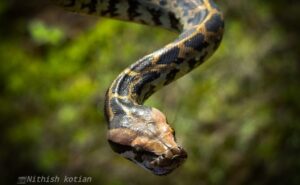
We plan to restore a forest of 20000 trees in the monsoon of July 2021! And we need your help to do that! Contribute saplings in Vruksh Khosh or donate Rs. 50 per sapling.